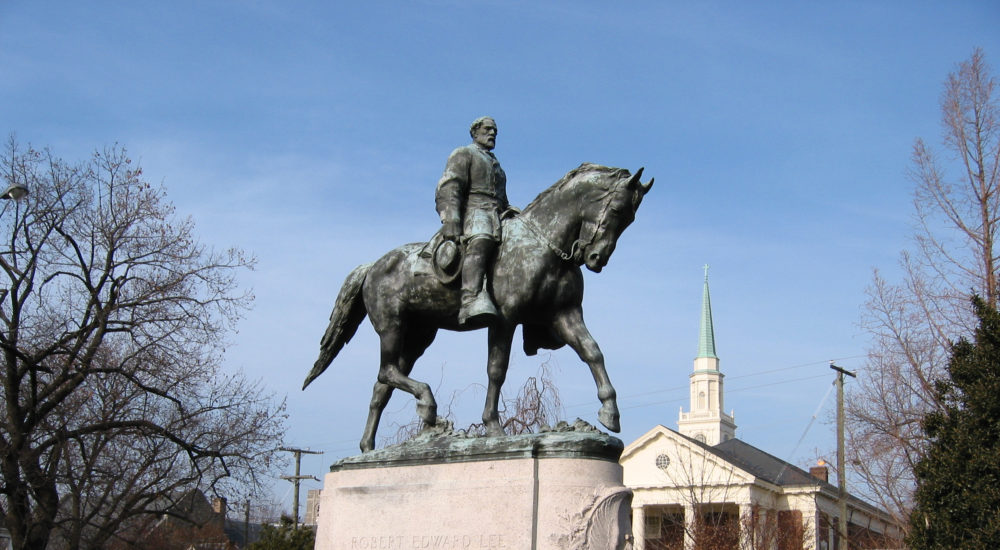Draim: In the Aftermath of Charlottesville Tear Down Barriers, Not Statues
By Evan Draim
There has been a lot of discussion about Confederate monuments since white supremacist thugs descended on Charlottesville for the supposed purpose of preserving a statue of Robert E Lee. Although these statues are pieces of our history that should not be removed, events in Charlottesville call us to examine racial inequality in our society and consider substantive policy changes to address it.
What happened this month in Charlottesville can only be described as tragic. Virginians mourned not only the death of an innocent victim – Heather Heyer – but also the display of intolerance and hatred that occurred within our commonwealth. In the aftermath of this tragedy, many of us have been searching for ways to show support for those affected by racism and to demonstrate that the swastika-bearing protesters in Charlottesville do not represent the citizens of Virginia.
We now have a choice regarding how to spend limited resources and political capital in standing up to racism. We can favor purely symbolic gestures – like tearing down statues – that make no real progress towards alleviating racial inequality while erasing history and perhaps even exacerbating racial tensions further. Alternatively, we can choose to address the substantive barriers to equal opportunity that unfairly place many racial minorities at a disadvantage. I strongly suggest that we opt for the latter.
If we do choose to address racism through substantive policy reform, we will have plenty of options.
Today African Americans are incarcerated at more than 5 times the rate of the general population. In addition, an African American defendant often receives a more serious sentence than a white defendant convicted of the same crime. Republicans and Democrats should work together to reform our criminal justice system and promote the freedom and dignity of every American. We must address these racial disparities in our justice system and reconsider the use of mandatory minimums in sentencing.
African American ex-offenders have a much harder time finding employment than their white counterparts. According to research from the NAACP, “the negative impact of a criminal record is twice as large for African American applicants.” This significantly impacts their ability to become rehabilitated back into society and makes it more likely that ex-offenders will end up in prison again. Lawmakers from both parties should be encouraged to support “ban the box” legislation, which would protect individuals from being discriminated against in employment for a previous nonviolent offense (unless their record is relevant to the job being sought).
African American students still receive an unequal education, with many minority students segregated into failing schools that do not offer them necessary opportunities to succeed. We should fight for every student to have the chance to realize their talents by putting more resources towards public schools in our inner cities and, at the same time, by giving parents more educational choice, regardless of their racial or socioeconomic background.
With regard to statues, we can preserve those that already exist while also striving to put our history into context by adding monuments honoring icons of civil rights. In order to represent the full spectrum of our commonwealth’s history, addition is a better policy than subtraction. Our public places should continue to include historic statues from previous generations alongside contemporary monuments to Harriet Tubman, Doug Wilder, Booker T. Washington, and Dred Scott. Doing so would make public places a fitting reminder of how far we have come as a society.
Not only would removing historic monuments be unadvisable in its own right, it would also jeopardize our ability to reach consensus on the important policy issues discussed above.
In order to achieve meaningful reform, it will take Virginians of all races, backgrounds, and political persuasions working together. Whether you agree with their perspective or not, many southerners view statues to Confederate figures as representing a part of their heritage, however flawed those figures may be. By making the post-Charlottesville conversation entirely about the removal of those statues, some activists are choosing to focus on an intentionally divisive issue that pits Virginians of different backgrounds against each other. This approach may deepen racial animosity instead of alleviating it – exactly what the white supremacists and neo-Nazis want.
I do not doubt that those favoring the removal of Confederate monuments have noble aims. All men and women of good conscience oppose racism and want to do whatever is in their power to eradicate it. However, in the fight against bigotry, we must choose substance over showmanship. Instead of tearing down statues, it is far wiser to tear down barriers.
—
Evan Draim is the 10th District representative for the Young Republican Federation of Virginia and FCRC Operations Chair for Dranesville district. He currently works for a nonprofit in Northern Virginia providing employment resources to individuals with disabilities. Evan is a recent graduate of Princeton University where he co-founded the Princeton Open Campus Coalition, an organization whose mission is to oppose historical revisionism and to promote free speech on university campuses.

